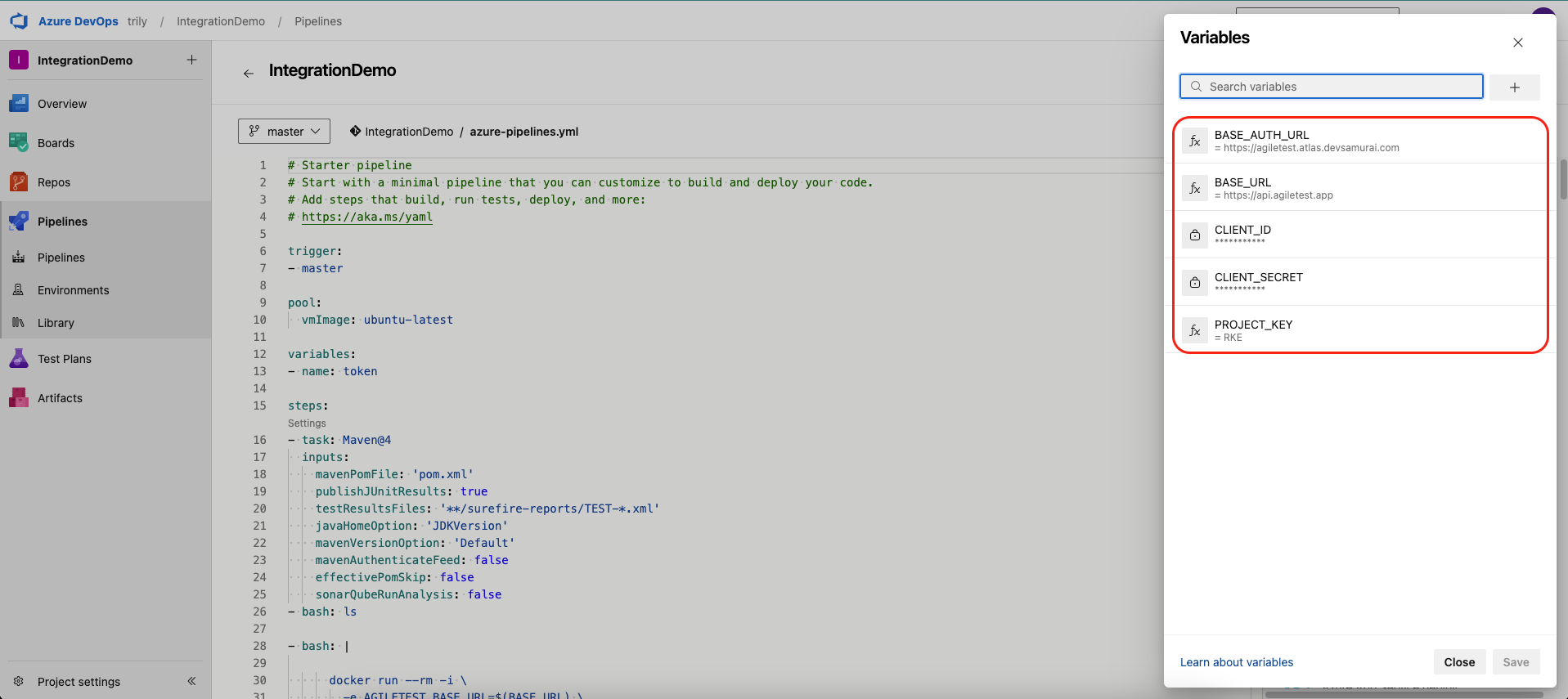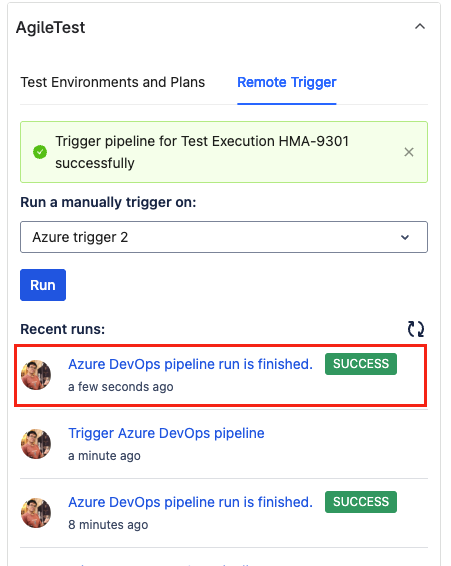Azure DevOps is a cloud computing platform developed by Microsoft that provides a wide range of services for computing, storage, networking, and artificial intelligence. With Azure DevOps, individuals and organizations can build, deploy, and manage applications and services in a flexible, scalable, and secure environment.
In this document, you will learn how to integrate AgileTest with Azure DevOps.
Firstly, you need to acquire Client id and Client secret from AgileTest. Please refer to this document for more details Access API documentation .
Make sure your account has permission to create TestCase and TestExecution issues; otherwise, the import will fail.
Setup your Azure DevOps project
In this example, we’re using JUnit tests, which is why the pipeline is set up as a Maven pipeline. An extra step is then added to send API requests or run the AgileTest commands that upload the test report (a .xml file in this case) to the application.
Here is a sample JUnit report to play around with.
JUnit report example
XML
<?xml version="1.0" encoding="UTF-8"?>
<testsuite xmlns:xsi="http://www.w3.org/2001/XMLSchema-instance" xsi:noNamespaceSchemaLocation="https://maven.apache.org/surefire/maven-surefire-plugin/xsd/surefire-test-report-3.0.xsd" version="3.0" name="calculateTest" time="0.005" tests="2" errors="0" skipped="0" failures="0">
<properties>
<property name="java.specification.version" value="17"/>
<property name="sun.jnu.encoding" value="UTF-8"/>
<property name="java.class.path" value="/Users/thachnguyen/Work/autotest/JunitAgileTestDemo/target/test-classes:/Users/thachnguyen/Work/autotest/JunitAgileTestDemo/target/classes:/Users/thachnguyen/.m2/repository/org/junit/jupiter/junit-jupiter-api/5.8.2/junit-jupiter-api-5.8.2.jar:/Users/thachnguyen/.m2/repository/org/opentest4j/opentest4j/1.2.0/opentest4j-1.2.0.jar:/Users/thachnguyen/.m2/repository/org/junit/platform/junit-platform-commons/1.8.2/junit-platform-commons-1.8.2.jar:/Users/thachnguyen/.m2/repository/org/apiguardian/apiguardian-api/1.1.2/apiguardian-api-1.1.2.jar:/Users/thachnguyen/.m2/repository/org/junit/jupiter/junit-jupiter-engine/5.8.2/junit-jupiter-engine-5.8.2.jar:/Users/thachnguyen/.m2/repository/org/junit/platform/junit-platform-engine/1.8.2/junit-platform-engine-1.8.2.jar:/Users/thachnguyen/.m2/repository/io/rest-assured/rest-assured/5.1.1/rest-assured-5.1.1.jar:/Users/thachnguyen/.m2/repository/org/apache/groovy/groovy/4.0.1/groovy-4.0.1.jar:/Users/thachnguyen/.m2/repository/org/apache/groovy/groovy-xml/4.0.1/groovy-xml-4.0.1.jar:/Users/thachnguyen/.m2/repository/org/apache/httpcomponents/httpclient/4.5.13/httpclient-4.5.13.jar:/Users/thachnguyen/.m2/repository/org/apache/httpcomponents/httpcore/4.4.13/httpcore-4.4.13.jar:/Users/thachnguyen/.m2/repository/commons-logging/commons-logging/1.2/commons-logging-1.2.jar:/Users/thachnguyen/.m2/repository/commons-codec/commons-codec/1.11/commons-codec-1.11.jar:/Users/thachnguyen/.m2/repository/org/apache/httpcomponents/httpmime/4.5.13/httpmime-4.5.13.jar:/Users/thachnguyen/.m2/repository/org/hamcrest/hamcrest/2.1/hamcrest-2.1.jar:/Users/thachnguyen/.m2/repository/org/ccil/cowan/tagsoup/tagsoup/1.2.1/tagsoup-1.2.1.jar:/Users/thachnguyen/.m2/repository/io/rest-assured/json-path/5.1.1/json-path-5.1.1.jar:/Users/thachnguyen/.m2/repository/org/apache/groovy/groovy-json/4.0.1/groovy-json-4.0.1.jar:/Users/thachnguyen/.m2/repository/io/rest-assured/rest-assured-common/5.1.1/rest-assured-common-5.1.1.jar:/Users/thachnguyen/.m2/repository/io/rest-assured/xml-path/5.1.1/xml-path-5.1.1.jar:/Users/thachnguyen/.m2/repository/org/apache/commons/commons-lang3/3.11/commons-lang3-3.11.jar:/Users/thachnguyen/.m2/repository/org/json/json/20210307/json-20210307.jar:/Users/thachnguyen/.m2/repository/org/junit/platform/junit-platform-reporting/1.9.1/junit-platform-reporting-1.9.1.jar:/Users/thachnguyen/.m2/repository/org/junit/platform/junit-platform-launcher/1.9.1/junit-platform-launcher-1.9.1.jar:"/>
<property name="java.vm.vendor" value="Eclipse Adoptium"/>
<property name="sun.arch.data.model" value="64"/>
<property name="java.vendor.url" value="https://adoptium.net/"/>
<property name="os.name" value="Mac OS X"/>
<property name="java.vm.specification.version" value="17"/>
<property name="sun.java.launcher" value="SUN_STANDARD"/>
<property name="user.country" value="VN"/>
<property name="sun.boot.library.path" value="/Library/Java/JavaVirtualMachines/temurin-17.jdk/Contents/Home/lib"/>
<property name="sun.java.command" value="/Users/thachnguyen/Work/autotest/JunitAgileTestDemo/target/surefire/surefirebooter-20250507171755717_3.jar /Users/thachnguyen/Work/autotest/JunitAgileTestDemo/target/surefire 2025-05-07T17-17-55_670-jvmRun1 surefire-20250507171755717_1tmp surefire_0-20250507171755717_2tmp"/>
<property name="http.nonProxyHosts" value="local|*.local|169.254/16|*.169.254/16"/>
<property name="jdk.debug" value="release"/>
<property name="surefire.test.class.path" value="/Users/thachnguyen/Work/autotest/JunitAgileTestDemo/target/test-classes:/Users/thachnguyen/Work/autotest/JunitAgileTestDemo/target/classes:/Users/thachnguyen/.m2/repository/org/junit/jupiter/junit-jupiter-api/5.8.2/junit-jupiter-api-5.8.2.jar:/Users/thachnguyen/.m2/repository/org/opentest4j/opentest4j/1.2.0/opentest4j-1.2.0.jar:/Users/thachnguyen/.m2/repository/org/junit/platform/junit-platform-commons/1.8.2/junit-platform-commons-1.8.2.jar:/Users/thachnguyen/.m2/repository/org/apiguardian/apiguardian-api/1.1.2/apiguardian-api-1.1.2.jar:/Users/thachnguyen/.m2/repository/org/junit/jupiter/junit-jupiter-engine/5.8.2/junit-jupiter-engine-5.8.2.jar:/Users/thachnguyen/.m2/repository/org/junit/platform/junit-platform-engine/1.8.2/junit-platform-engine-1.8.2.jar:/Users/thachnguyen/.m2/repository/io/rest-assured/rest-assured/5.1.1/rest-assured-5.1.1.jar:/Users/thachnguyen/.m2/repository/org/apache/groovy/groovy/4.0.1/groovy-4.0.1.jar:/Users/thachnguyen/.m2/repository/org/apache/groovy/groovy-xml/4.0.1/groovy-xml-4.0.1.jar:/Users/thachnguyen/.m2/repository/org/apache/httpcomponents/httpclient/4.5.13/httpclient-4.5.13.jar:/Users/thachnguyen/.m2/repository/org/apache/httpcomponents/httpcore/4.4.13/httpcore-4.4.13.jar:/Users/thachnguyen/.m2/repository/commons-logging/commons-logging/1.2/commons-logging-1.2.jar:/Users/thachnguyen/.m2/repository/commons-codec/commons-codec/1.11/commons-codec-1.11.jar:/Users/thachnguyen/.m2/repository/org/apache/httpcomponents/httpmime/4.5.13/httpmime-4.5.13.jar:/Users/thachnguyen/.m2/repository/org/hamcrest/hamcrest/2.1/hamcrest-2.1.jar:/Users/thachnguyen/.m2/repository/org/ccil/cowan/tagsoup/tagsoup/1.2.1/tagsoup-1.2.1.jar:/Users/thachnguyen/.m2/repository/io/rest-assured/json-path/5.1.1/json-path-5.1.1.jar:/Users/thachnguyen/.m2/repository/org/apache/groovy/groovy-json/4.0.1/groovy-json-4.0.1.jar:/Users/thachnguyen/.m2/repository/io/rest-assured/rest-assured-common/5.1.1/rest-assured-common-5.1.1.jar:/Users/thachnguyen/.m2/repository/io/rest-assured/xml-path/5.1.1/xml-path-5.1.1.jar:/Users/thachnguyen/.m2/repository/org/apache/commons/commons-lang3/3.11/commons-lang3-3.11.jar:/Users/thachnguyen/.m2/repository/org/json/json/20210307/json-20210307.jar:/Users/thachnguyen/.m2/repository/org/junit/platform/junit-platform-reporting/1.9.1/junit-platform-reporting-1.9.1.jar:/Users/thachnguyen/.m2/repository/org/junit/platform/junit-platform-launcher/1.9.1/junit-platform-launcher-1.9.1.jar:"/>
<property name="sun.cpu.endian" value="little"/>
<property name="user.home" value="/Users/thachnguyen"/>
<property name="user.language" value="en"/>
<property name="java.specification.vendor" value="Oracle Corporation"/>
<property name="java.version.date" value="2025-01-21"/>
<property name="java.home" value="/Library/Java/JavaVirtualMachines/temurin-17.jdk/Contents/Home"/>
<property name="file.separator" value="/"/>
<property name="basedir" value="/Users/thachnguyen/Work/autotest/JunitAgileTestDemo"/>
<property name="java.vm.compressedOopsMode" value="Zero based"/>
<property name="line.separator" value=" "/>
<property name="java.specification.name" value="Java Platform API Specification"/>
<property name="java.vm.specification.vendor" value="Oracle Corporation"/>
<property name="surefire.real.class.path" value="/Users/thachnguyen/Work/autotest/JunitAgileTestDemo/target/surefire/surefirebooter-20250507171755717_3.jar"/>
<property name="sun.management.compiler" value="HotSpot 64-Bit Tiered Compilers"/>
<property name="ftp.nonProxyHosts" value="local|*.local|169.254/16|*.169.254/16"/>
<property name="java.runtime.version" value="17.0.14+7"/>
<property name="user.name" value="thachnguyen"/>
<property name="path.separator" value=":"/>
<property name="os.version" value="15.2"/>
<property name="java.runtime.name" value="OpenJDK Runtime Environment"/>
<property name="file.encoding" value="UTF-8"/>
<property name="java.vm.name" value="OpenJDK 64-Bit Server VM"/>
<property name="java.vendor.version" value="Temurin-17.0.14+7"/>
<property name="localRepository" value="/Users/thachnguyen/.m2/repository"/>
<property name="java.vendor.url.bug" value="https://github.com/adoptium/adoptium-support/issues"/>
<property name="java.io.tmpdir" value="/var/folders/f0/hxzh9_fx1zb29pdn334l6nr40000gn/T/"/>
<property name="java.version" value="17.0.14"/>
<property name="user.dir" value="/Users/thachnguyen/Work/autotest/JunitAgileTestDemo"/>
<property name="os.arch" value="aarch64"/>
<property name="java.vm.specification.name" value="Java Virtual Machine Specification"/>
<property name="native.encoding" value="UTF-8"/>
<property name="java.library.path" value="/Users/thachnguyen/Library/Java/Extensions:/Library/Java/Extensions:/Network/Library/Java/Extensions:/System/Library/Java/Extensions:/usr/lib/java:."/>
<property name="java.vm.info" value="mixed mode, sharing"/>
<property name="java.vendor" value="Eclipse Adoptium"/>
<property name="java.vm.version" value="17.0.14+7"/>
<property name="java.specification.maintenance.version" value="1"/>
<property name="sun.io.unicode.encoding" value="UnicodeBig"/>
<property name="socksNonProxyHosts" value="local|*.local|169.254/16|*.169.254/16"/>
<property name="java.class.version" value="61.0"/>
</properties>
<testcase name="testAdd" classname="calculateTest" time="0.002"/>
<testcase name="testSubtract" classname="calculateTest" time="0.0"/>
</testsuite>
If you need more detailed examples, please refer to our public repository on AgileTest GitHub for additional sample projects.
Use API If you’d like to use API, then your Azure DevOps-pipelines.yml file should look like this.
AgileTest Cloud - YAML file AgileTest Cloud - azure-pipelines.yml
YAML
trigger:
- master
pool:
vmImage: ubuntu-latest
steps:
- task: Maven@4
inputs:
mavenPomFile: "pom.xml"
publishJUnitResults: true
testResultsFiles: "**/surefire-reports/TEST-*.xml"
javaHomeOption: "JDKVersion"
mavenVersionOption: "Default"
mavenAuthenticateFeed: false
effectivePomSkip: false
sonarQubeRunAnalysis: false
- script: |
token=$(curl "$(BASE_AUTH_URL)/api/apikeys/authenticate" -X POST -H 'Content-Type:application/json' --data '{"clientId":"$(CLIENT_ID)","clientSecret":"$(CLIENT_SECRET)"}' | tr -d '"')
curl -X POST "$(BASE_URL)/ds/test-executions/junit?projectKey=$(PROJECT_KEY)" -H "Content-Type:application/xml" -H "Authorization:JWT $token" --data-binary "@target/surefire-reports/TEST-calculateTest.xml"
displayName: "Run a one-line script"
As you can see, there are 2 steps in this file. The 1st one (Maven@4 task) is to build and run tests, and the 2nd one is for uploading test result to AgileTest.
In the 2nd step, we use 2 endpoints as follows
api/v1/apikeys/authenticate (for Cloud only) to get temporary token using acquired client_id and client_secret.
ds/test-executions/nunit to submit test report to Agile Test so that the application could create or update Test execution and Test cases accordingly.
To learn more about these endpoints, please refer to this document API document .
AgileTest Data center - YAML file For Data center version, we only use 1 endpoint ds/test-executions/junit with DC_TOKEN variable instead of the token that is requested using client id and client secret. Let’s take a look at the file below!
AgileTest Data center - azure-pipelines.yml
YAML
trigger:
- master
pool:
vmImage: ubuntu-latest
steps:
- task: Maven@4
inputs:
mavenPomFile: "pom.xml"
publishJUnitResults: true
testResultsFiles: "**/surefire-reports/TEST-*.xml"
javaHomeOption: "JDKVersion"
mavenVersionOption: "Default"
mavenAuthenticateFeed: false
effectivePomSkip: false
sonarQubeRunAnalysis: false
- script: |
curl -X POST "$(BASE_URL)/ds/test-executions/junit?projectKey=$(PROJECT_KEY)" -H "Content-Type:application/xml" -H "Authorization:Bearer $(DC_TOKEN)" --data-binary "@target/surefire-reports/TEST-calculateTest.xml"
displayName: "Run a one-line script" At this stage, your YAML file should be ready.
Use AgileTest CLI
On the other hand, if you use AgileTest CLI, then your Azure DevOps-pipelines.yml file should look like this.
AgileTest Cloud - YAML file AgileTest Cloud - azure-pipelines.yml
YAML
trigger:
- master
pool:
vmImage: ubuntu-latest
steps:
- task: Maven@4
inputs:
mavenPomFile: 'pom.xml'
publishJUnitResults: true
testResultsFiles: '**/surefire-reports/TEST-*.xml'
javaHomeOption: 'JDKVersion'
mavenVersionOption: 'Default'
mavenAuthenticateFeed: false
effectivePomSkip: false
sonarQubeRunAnalysis: false
- bash: |
docker run --rm -i \
-e AGILETEST_BASE_URL=$(BASE_URL) \
-e AGILETEST_AUTH_BASE_URL=$(BASE_AUTH_URL) \
-e AGILETEST_CLIENT_ID=$(CLIENT_ID) \
-e AGILETEST_CLIENT_SECRET=$(CLIENT_SECRET) \
ghcr.io/agiletestapp/agiletest-cli \
test-execution import \
--framework-type junit --project-key $(PROJECT_KEY) \
<target/surefire-reports/TEST-calculateTest.xml
displayName: "Upload report" As you can see, there are 2 steps in this file. The 1st one is to run tests and the 2nd one is for uploading test result to AgileTest.
After the 1st step is completed, it yields test reports. Then, in Upload report step (indicated by displayName property), the report is uploaded to AgileTest by using AgileTest CLI. Below is the command used for the task.
BASH
docker run --rm -i \
-e AGILETEST_BASE_URL=$(BASE_URL) \
-e AGILETEST_AUTH_BASE_URL=$(BASE_AUTH_URL) \
-e AGILETEST_CLIENT_ID=$(CLIENT_ID) \
-e AGILETEST_CLIENT_SECRET=$(CLIENT_SECRET) \
ghcr.io/agiletestapp/agiletest-cli \
test-execution import \
--framework-type junit --project-key $(PROJECT_KEY) \
<target/surefire-reports/TEST-calculateTest.xml AgileTest Data center - YAML file AgileTest Data center - azure-pipelines.yml
YAML
trigger:
- master
pool:
vmImage: ubuntu-latest
steps:
- task: Maven@4
inputs:
mavenPomFile: 'pom.xml'
publishJUnitResults: true
testResultsFiles: '**/surefire-reports/TEST-*.xml'
javaHomeOption: 'JDKVersion'
mavenVersionOption: 'Default'
mavenAuthenticateFeed: false
effectivePomSkip: false
sonarQubeRunAnalysis: false
- bash: |
docker run --rm -i \
-e AGILETEST_BASE_URL=$(BASE_URL) \
-e AGILETEST_AUTH_BASE_URL=$(BASE_AUTH_URL) \
-e AGILETEST_CLIENT_ID=$(CLIENT_ID) \
-e AGILETEST_CLIENT_SECRET=$(CLIENT_SECRET) \
ghcr.io/agiletestapp/agiletest-cli \
test-execution import \
--framework-type junit --project-key $(PROJECT_KEY) \
<target/surefire-reports/TEST-calculateTest.xml
displayName: "Upload report" Same as Cloud, in this file we also have 2 steps, run-test and upload-report . However, in run-test step, the command would look a little bit different 😉 .
BASH
docker run --rm -i \
-e AGILETEST_BASE_URL=$(BASE_URL) \
-e AGILETEST_DC_TOKEN=$(DC_TOKEN) \
ghcr.io/agiletestapp/agiletest-cli \
--data-center \
test-execution import \
--framework-type junit --project-key $(PROJECT_KEY) \
<target/surefire-reports/TEST-calculateTest.xml Next, add necessary pipeline variables as follows:
Pipeline variables
Variables
Description
Is secret?
Example
BASE_AUTH_URL
Base URL used for requesting authenticating token
https://agiletest.atlas.devsamurai.com
BASE_URL
Base URL to submit your report to
https://api.agiletest.app
CLIENT_ID
The client id that you have requested earlier
******
CLIENT_SECRET
The client secret that you have requested earlier
******
PROJECT_KEY
Your project key
RKE
Now your pipeline is good to go 😉
However, if you are working with AgileTest Data Center version, you will only need 3 variables as follows.
Variables
Description
Is secured?
Example
DC_TOKEN
Your Personal access token
BASE_URL
Base URL to submit your report to
PROJECT_KEY
Your project key
RKE
For each run, a new Test Execution will be created along with linked Test Cases . However, if the Test Cases already exist in your project, AgileTest will only generate a new Test Execution and link the matching Test Cases to it, including the test results.
View Pipeline Status AgileTest provides a simple way to track the status of your pipeline after it has been triggered. To enable this feature, just add the following directives to your workflow file.
YAML
- script: |
if [ "$(Agent.JobStatus)" == "Succeeded" ]; then
result="success";
else
result="failed";
fi
token=$(curl "$(BASE_AUTH_URL)/api/apikeys/authenticate" -X POST -H 'Content-Type:application/json' --data '{"clientId":"$(CLIENT_ID)","clientSecret":"$(CLIENT_SECRET)"}' | tr -d '"')
curl "$(BASE_AUTH_URL)/ds/test-executions/$(TEST_EXECUTION_KEY)/pipeline/history?projectKey=$(PROJECT_KEY)" -H "Content-Type: application/json" -H "Authorization: JWT $token" --data '{ "teamFoundationCollectionUri": "$(System.TeamFoundationCollectionUri)", "teamProjectId":"$(System.TeamProjectId)", "buildId": "'"$(Build.BuildId)"'", "tool": "Azure DevOpsDevOps", "result": "'"$result"'" }'
displayName: "Update history log"
Recently, Microsoft has marked the option below as an unrecommended setting, since it would make your Organization insecure. You may proceed with care.
For this configuration to work, you need to turn off the below option at Organization level (Organization settings) and Project level (Project settings).
Option to limit input variable from API request
https://learn.microsoft.com/vi-vn/azure/devops/pipelines/security/inputs .
💡 An alternative procedure, instead of disabling “Limit variables that can be set at queue time”, you can add additional environment variable, TEST_EXECUTION_KEY , to store Test execution issue key. With this, your history log will still be updated duly.
For Cloud version, we use the endpoint test-executions/{test_execution_id}/pipeline/history
However, if you are working with AgileTest Data center version, please use rest/agiletest/1.0/test-executions/{test_execution_id}/pipeline/history instead.
Your file should look like this now.
YAML file that includes pipeline status update call
YAML
trigger:
- master
pool:
vmImage: ubuntu-latest
steps:
- task: Maven@4
inputs:
mavenPomFile: "pom.xml"
publishJUnitResults: true
testResultsFiles: "**/surefire-reports/TEST-*.xml"
javaHomeOption: "JDKVersion"
mavenVersionOption: "Default"
mavenAuthenticateFeed: false
effectivePomSkip: false
sonarQubeRunAnalysis: false
- script: |
token=$(curl "$(BASE_AUTH_URL)/api/apikeys/authenticate" -X POST -H 'Content-Type:application/json' --data '{"clientId":"$(CLIENT_ID)","clientSecret":"$(CLIENT_SECRET)"}' | tr -d '"')
curl -X POST "$(BASE_URL)/ds/test-executions/junit?projectKey=$(PROJECT_KEY)" -H "Content-Type:application/xml" -H "Authorization:JWT $token" --data-binary "@target/surefire-reports/TEST-calculateTest.xml"
displayName: "Run a one-line script"
- script: |
if [ "$(Agent.JobStatus)" == "Succeeded" ]; then
result="success";
else
result="failed";
fi
token=$(curl "$(BASE_AUTH_URL)/api/apikeys/authenticate" -X POST -H 'Content-Type:application/json' --data '{"clientId":"$(CLIENT_ID)","clientSecret":"$(CLIENT_SECRET)"}' | tr -d '"')
curl "$(BASE_AUTH_URL)/ds/test-executions/$(TEST_EXECUTION_KEY)/pipeline/history?projectKey=$(PROJECT_KEY)" -H "Content-Type: application/json" -H "Authorization: JWT $token" --data '{ "teamFoundationCollectionUri": "$(System.TeamFoundationCollectionUri)", "teamProjectId":"$(System.TeamProjectId)", "buildId": "'"$(Build.BuildId)"'", "tool": "Azure DevOpsDevOps", "result": "'"$result"'" }'
displayName: "Update history log" If you include this part to your YAML file, on pipeline’s completion, a history log with pipeline status will be added on the right panel of the execution issue screen as below.
History log on pipeline status
Should you need any assistance or further AgileTest inquiries, contact here !


![]() To learn more, please refer to this article https://learn.microsoft.com/vi-vn/azure/devops/pipelines/security/inputs.
To learn more, please refer to this article https://learn.microsoft.com/vi-vn/azure/devops/pipelines/security/inputs.
.png)